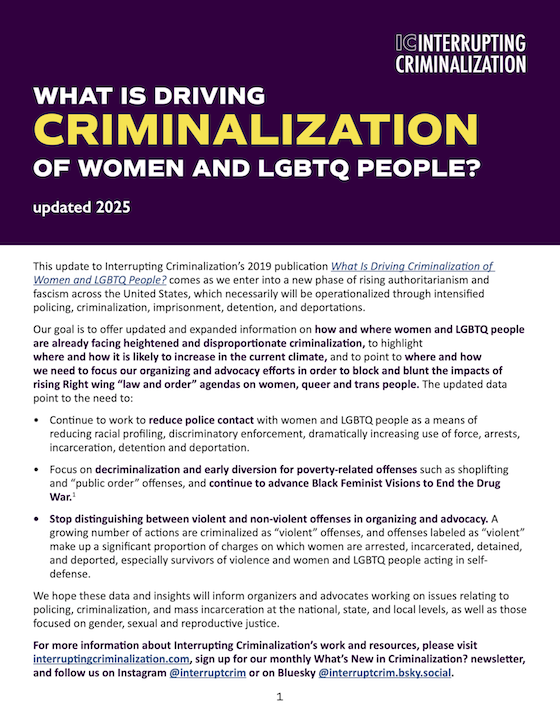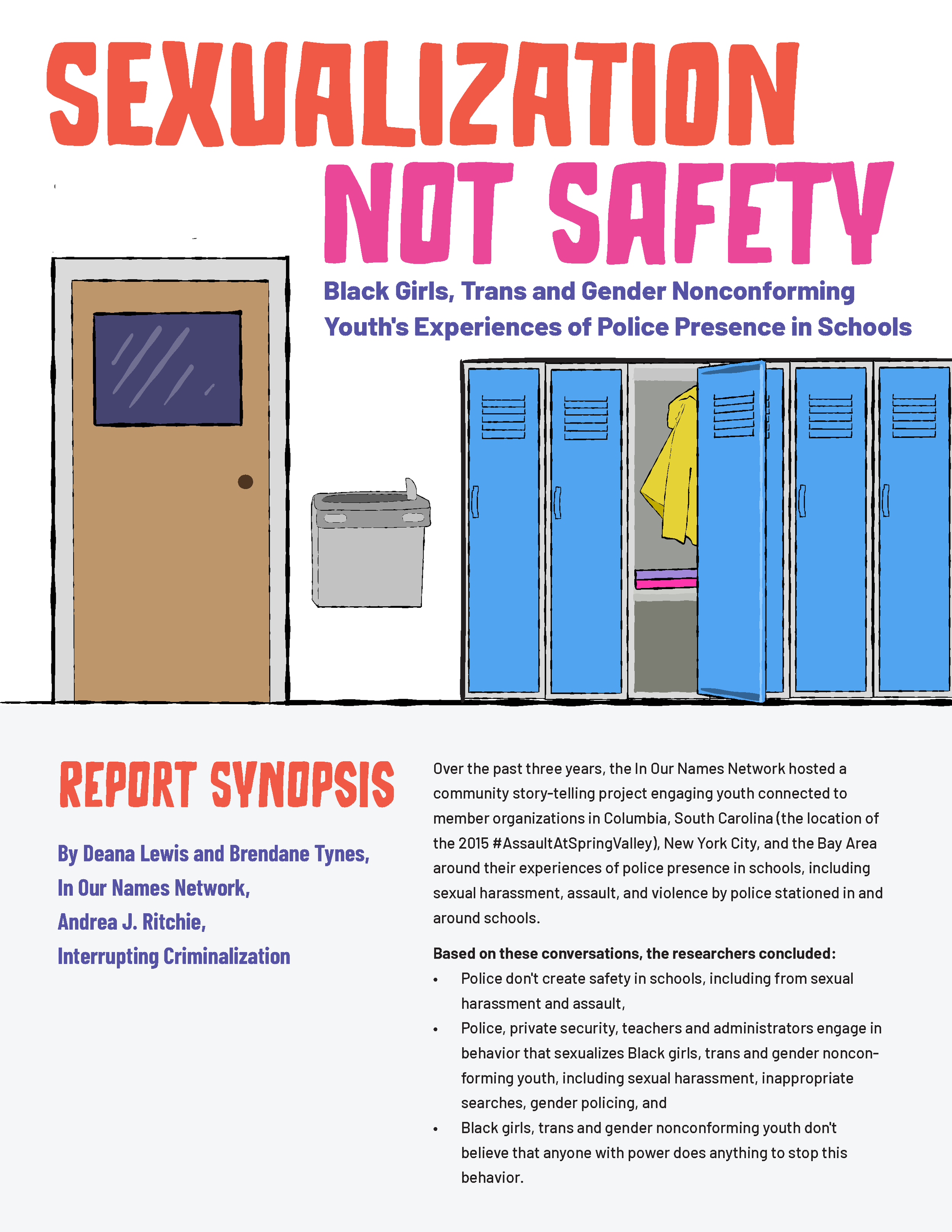Protest, Power, and the the Violence Debate: A Zine
A zine on protest, power, and “violence” in social movements, adapted directly from Chapter 6 of the book Let This Radicalize You: Organizing and the Revolution of Reciprocal Care by Kelly Hayes and Mariame Kaba.
A [short] History of U.S. Police & Tear Gas
A zine by Mariame Kaba that goes over some historical background about U.S. police and their use of tear gas, along with archival photos and documents from Kaba’s collection.
Block & Build
Inspired by “Block & Build” sheets circulating, Interrupting Criminalization offers an abolitionist take on strategic frameworks for fighting Right-wing, authoritarian, and fascist agendas and regimes.
Don’t Be A Copagandist: Migration Edition
A resource for media and organizers aimed at transforming the narrative about migration. Like our other “Don’t Be A Copagandist” guides, this resource is helpful for anyone to read and take note of, regardless of profession.
Criminalizing Librarians
Most often, attacks on libraries focus on books—various interest groups have tried to remove a wide range of books from library shelves. Sometimes, though, librarians who take the egalitarian mission of the library seriously have also become targets of their communities or of the state.
Arrested at the Library
Read, print, and share Interrupting Criminalization’s new zine. Readers will learn about the history of police in libraries, tales of librarians who have been targeted by law enforcement and those that have resisted policing the stacks. With books, libraries, and library patrons under threat, explore histories of resistance to policing inside libraries and the calls to action going out today.
Diversion Derailed
A report by the National Black Women’s Justice Institute and Interrupting Criminalization that examines diversion programs from the perspective of the people they impact the most — participants themselves — and offers recommendations for program evaluation and creation of community-based programs that genuinely divert people from the criminal punishment system toward sustainable well-being.
What Is Driving Criminalization of Women and LGBTQ People? Update
This update to Interrupting Criminalization’s 2019 publication What Is Driving Criminalization of Women and LGBTQ People? comes as we enter into a new phase of rising authoritarianism and fascism across the United States, which necessarily will be operationalized through intensified policing, criminalization, imprisonment, detention, and deportations.
Building Black Feminist Visions to End the Drug War: Report
A report summarizing the impacts of the global drug war on Black women, girls, and trans and gender nonconforming people, as well as the Black feminist visions, analysis, and needs articulated during the Building Black Feminist Visions to End the Drug War convening hosted by Interrupting Criminalization, the Drug Policy Alliance, and In Our Names Network in June 2023.
Reformist Reforms vs. Abolitionist Steps to End the Drug War
Chart breaking down the difference between reformist reforms which continue or expand the reach of the drug war, and abolitionist steps that work to chip away and reduce its overall impact. Originally from the report, Building Black Feminist Visions to End the Drug War.
Sexualization Not Safety: Black Girls, Trans, and Gender Nonconforming Youth’s Experiences of Police Presence in Schools: Report
A report sharing insights from a 3-year community story-telling project engaging Black girls, trans and GNC youth around their experiences of police presence in schools, including sexual harassment, assault, and violence.
Building Coordinated Crisis Response Learning Space
A summary of lessons learned over the past two years of IC’s monthly, virtual peer learning space for organizations working to collectively intervene in and respond to crises without police — including issues explored, resources shared, questions to consider, and pitfalls to avoid.
Don’t Be A Copagandist: Israeli Militarism Edition
A resource for media on covering Palestine and Israel. This guide attempts to unpack a few key places where IDF propaganda shows up in news reporting, offers tips for what (and what NOT) to do in coverage, and shares additional recommended resources.
5 Years of Interrupting Criminalization: Quilting Black Feminist Resistance
Challenging, interrupting, and building a world beyond criminalization is the unifying thread of IC’s work — and of the infrastructure and resources we are creating to support organizers on the ground across the country. Learn more in this summary of IC’s first five years of work.
An Annotated Version of the Indictment Filed Against #StopCopCity Organizers
An annotated version of the indictment filed against #StopCopCity organizers, featuring critical information and context, questions for discussion, and more.
Don’t Be A Copagandist: Police Sexual Violence Edition
A resource for journalists covering the issue of sexual violence by law enforcement agents, including police, school “resource” officers, school “safety” officers, private security stationed in schools, probation, parole, and immigration authorities, and Customs and Border Patrol.
Building Black Feminist Visions to End the Drug War: Summary
A resource summarizing key information from the Building Black Feminist Visions to End the Drug War convening, which took place in June 2023, bringing together dozens of Black feminist leaders and allies from 6 countries to explore the possibilities for a shared Black feminist vision and plan of action toward a world that centers bodily autonomy and self-determination in all forms.
Sexualization Not Safety: Black Girls, Trans, and Gender Nonconforming Youth’s Experiences of Police Presence in Schools: Report Synopsis
A report synopsis of a 3-year community story-telling project engaging youth in Columbia, S.C., New York City, and the Bay Area around their experiences of police presence in schools, including sexual harassment, assault, and violence by police stationed in and around schools.
An Introduction to Police Fraternal Organizations
An introduction to Police Fraternal Organizations, including what they are, why we should care, how they harm women and girls of color, and systemic responses we can use to combat them.
Fight the (FOP) Power!
A resource explaining why it is important to focus on police fraternal organizations as we work to divest from policing and create safer communities, including FAQs and core strategies for challenging and shrinking the power, resources, and legitimacy of PFOs.

![A [short] History of U.S. Police & Tear Gas](https://images.squarespace-cdn.com/content/v1/5ee39ec764dbd7179cf1243c/1750100976099-SV0HTNPGKTRTKN11U0BU/A+Short+History+of+U.S.+Police+and+Tear+Gas+-+cover.png)

















